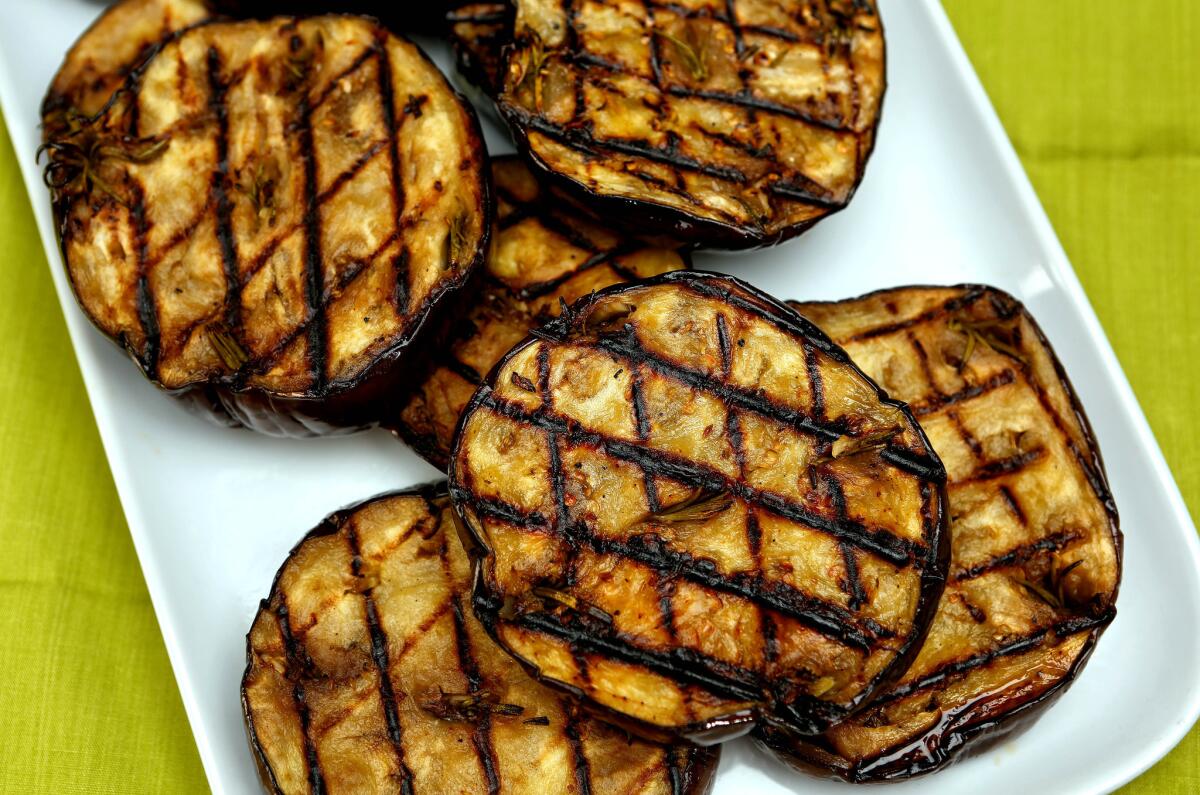Eggplant: To salt or not to salt?

Grilling eggplant? No need to salt first.
Most recipes for eggplant insist you salt it before cooking. Really? In most cases, that’s just not necessary.
After an extended series of experiments, I found you only need to salt eggplant if you’re going to be frying it, and even then only sometimes. If you’re cooking it in some other way — roasting, grilling, steaming — salting has no effect.
And when you are salting eggplant for frying, it takes a lot more than just a quick sprinkle and rinse.
More eggplant tips and 12 recipes
There are a lot of theories about salting eggplant — and most of those are wrong, too.
The predominant one is that it draws off bitter juices, improving the flavor. In fact, bitterness in eggplant comes either from the variety (those small seedy green Southeast Asian varieties are actually prized for this), or from being over-mature (choose eggplants that are rock-hard to avoid it).
To settle the matter of salting or not, I bought a bunch of eggplants and spent a couple of weekends testing.
First, I sliced up a bunch of eggplant and salted it. Every half hour, I pulled a couple of slices, rinsed them and patted them dry, then cooked them in a skillet with olive oil and on the grill.
Even before cooking, the salted slices looked different from the unsalted. The bowl under the colander that held the salted eggplant had a quarter of an inch of brown water in it, and the slices had turned flimsy.
SIGN UP for the free In the Kitchen newsletter >>
So salting had pulled moisture from the eggplant. But after I had cooked them, there was no difference in bitterness, and only a slight difference in saltiness (remember, if you’re salting, season accordingly).
The big difference was in texture — but only for the fried eggplant. The grilled eggplant was the same, salted or not.
The salted eggplant that had been fried was creamier and more luscious. The unsalted fried eggplant was firmer and slightly fibrous.
Despite some claims to the contrary, there was no difference in the amount of oil absorbed between salted and not-salted. Eggplant absorbs a LOT of oil either way.
That difference in texture became more pronounced the longer the eggplant had been salted. Salting for 30 minutes seemed to make only a minor difference. The sweet spot seems to be between 60 and 90 minutes.
So pulling liquid from eggplant by salting does make a difference when frying. What if we took it to the next step? Theoretically, anyway, the more liquid you pulled, the more noticeable the effect.
I ran a second set of experiments, salting and pressing the eggplant under a weight. This time, half the eggplant slices had been salted and stacked in a colander under a weighted plate. Just to double-check, I cooked an unsalted slice alongside.
Again, salting made a difference in texture, but pressing only seemed to be noticeable over extended salting times (more than a couple of hours). Even then, though, the difference was small. It’s a step that can easily be skipped.
So, should you always salt eggplant before frying? Not necessarily; it depends on what you’re looking for in the finished dish.
Though salting works when you want the eggplant to be creamy and tender — such as with parmigiana — in those cases where you want the eggplant to retain its shape and have a slightly firmer texture — such as ratatouille — you can skip it.
Are you a food geek? Follow me on Twitter @russ_parsons1
ALSO:
How to peel ginger -- with a spoon
Five great back-to-school snacks
What’s in season? It’s all here
More to Read
Eat your way across L.A.
Get our weekly Tasting Notes newsletter for reviews, news and more.
You may occasionally receive promotional content from the Los Angeles Times.








